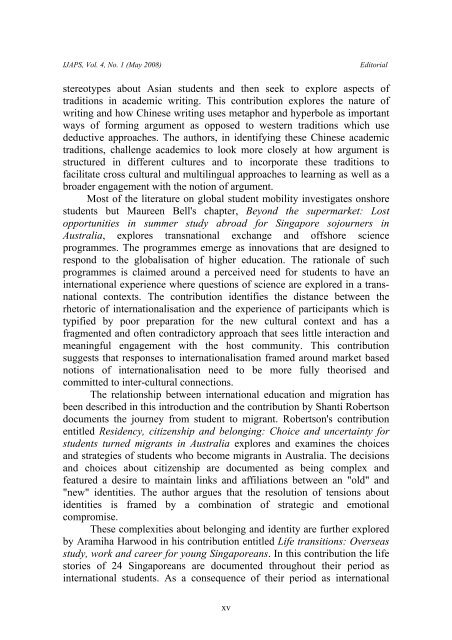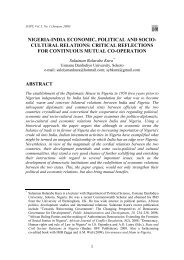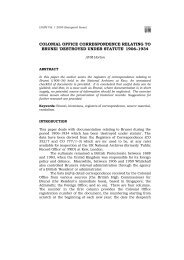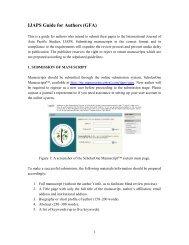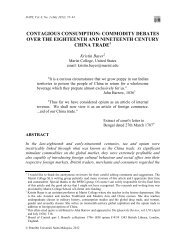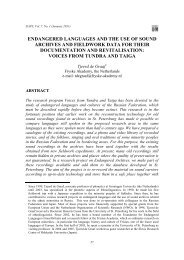This edition of the International Journal of Asia Pacific Studies ...
This edition of the International Journal of Asia Pacific Studies ...
This edition of the International Journal of Asia Pacific Studies ...
You also want an ePaper? Increase the reach of your titles
YUMPU automatically turns print PDFs into web optimized ePapers that Google loves.
IJAPS, Vol. 4, No. 1 (May 2008)Editorialstereotypes about <strong>Asia</strong>n students and <strong>the</strong>n seek to explore aspects <strong>of</strong>traditions in academic writing. <strong>This</strong> contribution explores <strong>the</strong> nature <strong>of</strong>writing and how Chinese writing uses metaphor and hyperbole as importantways <strong>of</strong> forming argument as opposed to western traditions which usedeductive approaches. The authors, in identifying <strong>the</strong>se Chinese academictraditions, challenge academics to look more closely at how argument isstructured in different cultures and to incorporate <strong>the</strong>se traditions t<strong>of</strong>acilitate cross cultural and multilingual approaches to learning as well as abroader engagement with <strong>the</strong> notion <strong>of</strong> argument.Most <strong>of</strong> <strong>the</strong> literature on global student mobility investigates onshorestudents but Maureen Bell's chapter, Beyond <strong>the</strong> supermarket: Lostopportunities in summer study abroad for Singapore sojourners inAustralia, explores transnational exchange and <strong>of</strong>fshore scienceprogrammes. The programmes emerge as innovations that are designed torespond to <strong>the</strong> globalisation <strong>of</strong> higher education. The rationale <strong>of</strong> suchprogrammes is claimed around a perceived need for students to have aninternational experience where questions <strong>of</strong> science are explored in a transnationalcontexts. The contribution identifies <strong>the</strong> distance between <strong>the</strong>rhetoric <strong>of</strong> internationalisation and <strong>the</strong> experience <strong>of</strong> participants which istypified by poor preparation for <strong>the</strong> new cultural context and has afragmented and <strong>of</strong>ten contradictory approach that sees little interaction andmeaningful engagement with <strong>the</strong> host community. <strong>This</strong> contributionsuggests that responses to internationalisation framed around market basednotions <strong>of</strong> internationalisation need to be more fully <strong>the</strong>orised andcommitted to inter-cultural connections.The relationship between international education and migration hasbeen described in this introduction and <strong>the</strong> contribution by Shanti Robertsondocuments <strong>the</strong> journey from student to migrant. Robertson's contributionentitled Residency, citizenship and belonging: Choice and uncertainty forstudents turned migrants in Australia explores and examines <strong>the</strong> choicesand strategies <strong>of</strong> students who become migrants in Australia. The decisionsand choices about citizenship are documented as being complex andfeatured a desire to maintain links and affiliations between an "old" and"new" identities. The author argues that <strong>the</strong> resolution <strong>of</strong> tensions aboutidentities is framed by a combination <strong>of</strong> strategic and emotionalcompromise.These complexities about belonging and identity are fur<strong>the</strong>r exploredby Aramiha Harwood in his contribution entitled Life transitions: Overseasstudy, work and career for young Singaporeans. In this contribution <strong>the</strong> lifestories <strong>of</strong> 24 Singaporeans are documented throughout <strong>the</strong>ir period asinternational students. As a consequence <strong>of</strong> <strong>the</strong>ir period as internationalxv


